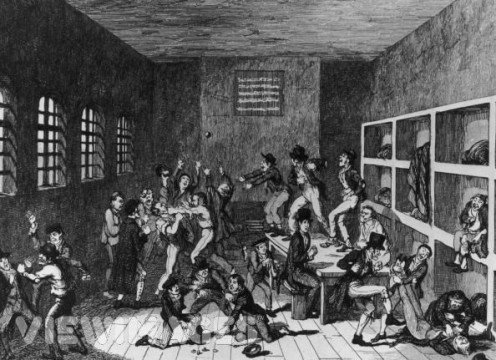By Brendan W. Clark ’21
Editor; History Major
About the Thesis Writer: Christopher Bulfinch ’18 is a senior history major and thesis writer. Chris came to Trinity knowing that he wanted to study history, but did not declare until the spring of his sophomore year. He has studied a myriad of topics from within the history department, but takes a particular interest in subjects of Americana. However, one of his favorite courses falls outside of this realm: “Living on the Margins of Modern Japan,” taught by Jeffery Bayliss, is a course he highly enjoyed and encourages prospective or current history majors to take.
Chris attributes his involvement in the Guided Studies program (now the Humanities Gateway Program) as significantly influencing his interest in history, citing especially the “exposure to a wide variety of foundational topics for interpreting historical concepts.” Within the guided studies program, some of Chris’ favorite courses included Professor Samuel Kassow’s “Modern European History.” Chris is currently the Editor-in-Chief of The Trinity Tripod, with which he has been involved since his freshmen year. Chris, in his spare time, is also an avid numismatist.

Favorite Period of History: Chris is particularly interested in the study of Americana, but also has an interest in the far-reaching impacts of European colonialism.
The Thesis Proposal: “Compare and contrast the experiences of individuals in debtor’s prison in early Republican Boston, using the letters of my ancestor, Charles Bulfinch, to determine the actual realities of prison life and, additionally, examine the implications of social class in debtor’s prisons.”

The Thesis Unpackaged: Chris originally was pursuing two broad ideas: the experience of fugitive slaves in Boston and the experience of those incarcerated in debtor’s prisons. After surveying the existing literature, Chris decided that he wanted to focus on something that could be original and settled on the debtor’s prison as his thesis topic, as there is nascent literature on the subject of prisoner’s individual experiences.
Chris’ primary sources include a significant amount of correspondence from his relative, Charles Bulfinch, who was an architect, police superintendent, and member of Boston’s Board of Selectmen during the Republican period. Chris, through his research, has found that “debt was understood, during the time, to be a very feminine attribute.” Chris has found that many articles and correspondence note the sense that prisoners had “lost their masculinity” as a result of losing control of their finances.
While finding the horrid conditions of debtor’s prisons deplorable, Chris has not found this to be particularly surprising considering previous historical anecdotes on the topic. However, Chris did find it disconcerting to hear that his ancestor, Charles, had been involved in coordinating the deportation of more than 200 fugitive slaves back to the south during his tenure as the Boston police superintendent.
Chris has worked extensively with the Massachusetts Historical Society and the Boston Public Library to find additional sources from which to compare the correspondence of his ancestor. The support of outside agencies has been “critical” to deriving research and assembling a bibliography, added Chris.
Chris is currently drafting his thesis and will formally present it at the History Department’s Thesis Presentations Ceremony on Wednesday, May 2nd, 2018 from 9:00 A.M.-12:00 A.M. in Seabury 215.
